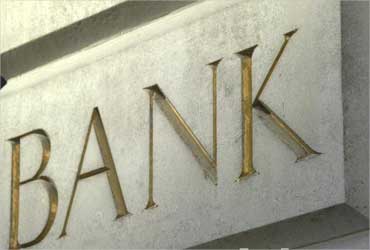 | « Back to article | Print this article |
Public sector banks seen as safe bets despite blips
Stocks of public sector banks are on average down 20 per cent over the past six months and about four per cent in the last month, under the impact of margin pressures, higher staff costs and portfolio quality issues necessitating a sharp increase in loan loss provisioning.
With several PSB stocks trading below their consensus 2011-12 estimated book values, the discount to their private banking peers has widened.
Analysts say the attractive valuations accompany persisting concerns on further portfolio quality deterioration, along with a weakening environment, which may slow credit growth and hurt net interest margins.
Thus, they recommend being selective and prefer the stocks of Bank of Baroda, Union Bank, Central Bank and Andhra Bank from a short to medium-term perspective.
Click NEXT to read more...
Public sector banks seen as safe bets despite blips
The high interest rate regime will hurt credit demand, margins and portfolio quality of the banking sector over the next one to three quarters.
While the central bank itself has lowered its credit growth outlook for 2011-12 to 19 per cent, distinctly lower than the near-22 per cent level in 2010-11, some analysts believe it could range lower and hurt pricing power of banks.
Net interest margins, down 10-15 basis points (100 bps is one per cent) sequentially for public sector banks, are expected to stay under pressure.
Click NEXT to read more...
Public sector banks seen as safe bets despite blips
He expects an additional 20 bps average margin impact on banks in coverage.
There are concerns on asset quality, too. These stem from the impact of the 2008 farm loan waiver on repayment culture in the agriculture portfolio, significant restructuring in the microfinance loan-book and the present concerns on infrastructure portfolio.
Provisioning costs are up 51 per cent sequentially on average for PSBs (against lower costs seen by most private banks).
Also, slippages from restructured books (agri and others) are likely to continue, adding stress to portfolio quality.
Click NEXT to read more...
Public sector banks seen as safe bets despite blips
While the sector may flounder for some more time, given the overall market pessimism and a sense that the discount to median longer-term valuations is still not high enough, a lot of the negatives are priced in.
Also, valuations for some PSBs are slipping into an attractive zone from a one-year outlook.
The key PSB picks would be banks with strong Casa (current account, savings account) deposits to buffer margins, strong capital base for growth and lower negative surprise potential on portfolio quality.
Krishnan of Ambit pegs Bank of Baroda as his top choice, given its strong margin defence and asset quality, which could have bottomed out.
Click NEXT to read more...
Public sector banks seen as safe bets despite blips
Sequentially, stable NIMs with healthy Casa franchise is its calling card. Management change is seen as a risk, as its CMD, M V Nair, is due to retire this month.
State Bank of India is where the most investor concerns lie, especially after the 99 per cent bottom line knock (alongside operational issues, including lower NIMs and asset quality) when its new management took on a spring-cleaning exercise. Growth is expected to remain subdued.
Click NEXT to read more...
Public sector banks seen as safe bets despite blips
However, there is no denying the longer term potential of the big daddy of them all.
Investors with a perspective of over a year may consider it.
Punjab National Bank has acute asset quality concerns, stemming from its exposure to commercial real estate.
Still, it looks attractive, given its Casa franchise and margin buffer derived from disciplined loan pricing, with relatively higher yields from its riskier assets.
Click NEXT to read more...
Public sector banks seen as safe bets despite blips
This bodes well for earnings (21 per cent CAGR expected over the next two years, with FY12 return on equity estimated at 22 per cent), even on adjusting for higher slippages.
Among smaller banks, Central Bank at a price to book value of about 0.8 FY12 consensus estimates looks attractive, given its strong NIMs and improving asset quality.
Andhra Bank has also seen asset quality improve.







